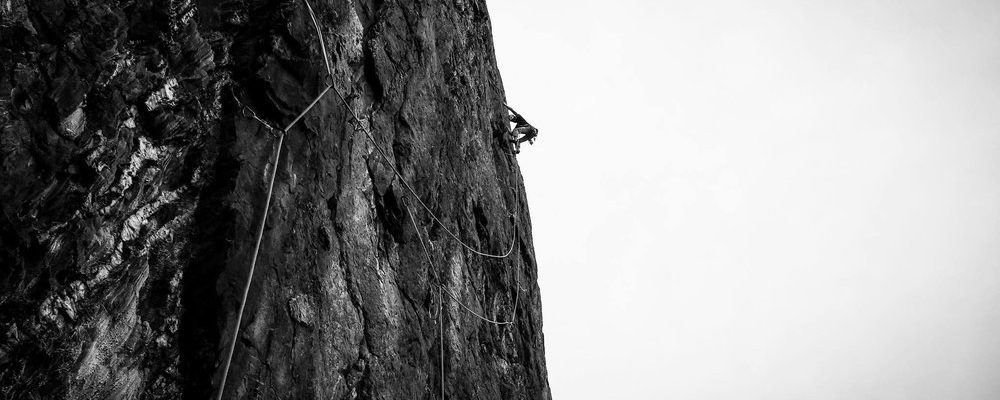‘You haven’t been to Red Walls? What!’
John gave a warm Irish chuckle. It made me feel both guilty and excused at the same time.
But I knew it, too: not climbing a single route on one of the most famous cliffs at Gogarth was a glaring omission, especially considering how often I’ve climbed here. Time and time again, I’ve gripped those quartzite pinches, searched for a hold amongst the ‘beard’ lichen, and watched seals bob in the sea. But to tell the truth, I’d been putting off a visit to Red Walls, afraid of what I might find…
Driving north-west through Anglesey, green fields rushed past and my anticipation grew. Red Walls is a serious and adventurous crag, a chaotic border between the Welsh mountains and the Irish Sea. The rock has been sculpted with a cheese knife, and is about the same solidity; intricate spikes, curves, grooves and blobs are artfully dashed all over the wall. It’s as if a master patisserie chef has crafted the top of a cake, then turned it to vertical and splashed it with red, gold and orange.
More green fields, and the road signs counted down like a timer. 12 miles to Holyhead. White lines flashed, the engine hummed. 10 miles. The clouds brightened, and suddenly we were in sunshine. 8 miles, and my thoughts began to tumble. I remembered the famous stories: holds breaking, ropes cutting, huge falls past the belay. And the pitches are long – that fall must’ve been quite a pisser!
For some reason, climbers feast on the Red Walls taste sensation, shuffling slowly upwards. Slings are draped on every possible horn of sandy rock. The seriousness creates a heady sugar-rush, even though you can place racks and racks worth of useless gear. Every delicious hold is a hold… but which hold will hold?
Sometimes, a hold will creak… shudder… and snap! and break free from the wall, gleefully plummeting into the sea below. Hopefully, the climber doesn’t join it.
We arrived, and a few hours later, John and I popped my Red Walls cherry with a couple of classics: Cannibal (E4 5c), Mantrap (E3 5b), and Khmer Rouge (E5 6a). John’s mind buzzed with the tune of, ‘the buttery biscuit base,’ while I imagined all the sandy, cheesy, biscuity holds to be real cakes and treats.
My past experience in loose, chossy rock helped me through the day, and suddenly I was addicted, craving another hit. But just like any addiction, the climbing here must be moderated. John laughed again; ‘I’ve never done the same route twice! No way…’
For much of the year, the Red Walls cake belongs to the birds. They chatter, squawk, ak-ak-ak, generally shitting all over the place until flying south at the end of summer. And then – only then – do climbers slip and slide down their abseil rope, dropping further and further from the safety of the cafe. The twitchers bristle and point: ‘look at those abseilers!’
Second time around, Big Tim and I made the drive through Anglesey. He was psyched and has done almost all the routes, while I was psyched and have barely done any. I had something in mind, though: Heart of Gold Direct combined with Ramalina. James McHaffie, one of Britain’s best sandbaggers, climbed this while John and I were here, and commented on its quality. I knew HOGD was about E6 6a, and Ramalina bumped the grade into 6b. I figured just doing HOGD alone would be amazing; Ramalina would be a lucky bonus – a tasty dessert.
With Tim settled on the belay, I set off up Heart of Gold Direct, tiptoeing towards the middle of the wall. The rock was dubious here, a dark meringue colour, so every hold was inspected, tapped, gently weighted… then committed to. I crept upwards, almost in slow motion, aiming for big flakes of cake toppings. A micro-cam behind a booming flake; a brass offset; a sling over a shallow spike. If I took any of the protection in isolation, I’d have laughed in disbelief: ‘what’s that gonna do?!’ But I had to put something in, because it’s the best there was – and at least it might’ve slowed me down.
Days could’ve passed, the world could’ve ended, but still I was in my little bubble of inspect, tap, commit. Had Tim fallen asleep? Would I have noticed?
Into the crux of HOGD, and the route became wonderful face climbing on (relatively) solid rock, a deep rust colour. The holds were all incut crimps, perfect for my fingertips, and despite my gently burning forearms I found I was really enjoying myself.
At the junction between the HOGD exit and Ramalina, I shouted down to Tim. ‘It’s a shame I haven’t got much gear left!’ Below, swinging in the wind, was most of a double rack of cams, two and a half sets of wires and about 17 quickdraws. Above me was ‘only’ 20 metres of climbing and ‘only’ a 6b crux. From a distance, I saw Caff took his time on this pitch, so I knew it couldn’t have been a cruise. I considered my options, and my recovered forearms answered for me: ‘go!’
Climbing up toward the steepest section of the wall, I felt more anxious and alert. Inspect, tap, commit, a bit like winter climbing. I chalked up in preparation of chalking up – the holds were coated with a film of sand, and I wiped my fingers on my shirt. The closer I got to the crux bulge, the more I shook out, chalked up… commit… no, wait!
The crux was a series of small crimps and pockets, all perfectly placed and in sequence. The master patisserie chef must’ve taken great care over this section. If I fell, I would’ve gone for miles – probably ripping several pieces of gear – but I knew I’d stop eventually. With pump rising, I brushed off more Gogarth ‘beard’ lichen and searched for the next crimp. I forced myself to climb higher, further from my protection. I imagined the rock rushing up from beneath me if a hold broke, red and gold and orange blurring and the gear going, ‘ping… ping… ping!’ as it popped and then the crunch of my bones.
But the rock didn’t break, and once through the crux I pressed on as fast and as carefully as I could. I didn’t dare hang around any longer. All I could think was, ‘get me out of this crazy chaos,’ over and over.
Belaying at the cliff edge, 59 metres of rope beneath me, I watched as Tim climbed. The salty sea was far below; it frothed and foamed, eager to taste the Red Walls sugary topping. Water punched and licked at the rock’s surface, and fluffs of lichen rose on the updraft. I could hardly believe I’d managed the pitch, psyched to have combined two routes into one giant monster. I gazed out to sea and grinned.
On the drive home, I felt whacked; I was suffering from a Red Walls sugar crash and I knew I needed some time out. The car engine hummed in a quieter tone, and the dusk light lengthened. We drifted back towards the mainland.
But, like a true addict, I knew I’d be back.
Main image: Tim Neill
 Tom Livingstone is a 26-year-old climber and writer based in North Wales, UK. He has a penchant for trad, winter and alpine climbing – the bigger and harder, the better. Find out more at www.tomlivingstone.com
Tom Livingstone is a 26-year-old climber and writer based in North Wales, UK. He has a penchant for trad, winter and alpine climbing – the bigger and harder, the better. Find out more at www.tomlivingstone.com






